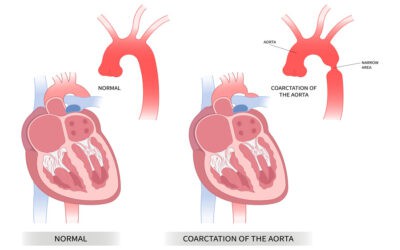Arrhythmia refers to an abnormal heart rhythm or irregular heartbeat. It is a broad term that encompasses various conditions characterized by irregularities in the electrical signals that regulate the heart’s pumping action.
In a healthy heart, the heartbeat is controlled by a coordinated electrical system. The sinoatrial (SA) node, located in the right atrium, generates electrical impulses that initiate each heartbeat. These impulses travel through the heart’s electrical pathways, causing the chambers (atria and ventricles) to contract and pump blood throughout the human body effectively.
Arrhythmias occur when there are disturbances in this electrical system, causing the heart to beat abnormally. This can mean the heart beats too fast, too slow, or on an uncoordinated pattern.
What are the major types of different arrhythmias?
There are a few different types of arrhythmias to note, according to the American Heart Association. Arrhythmias can affect either the atria (upper chambers) or the ventricles (lower chambers) of the heart, and they can be classified into different types, including…
-
- Supraventricular arrhythmias: These arrhythmias originate above the ventricles and include conditions such as atrial fibrillation, atrial flutter, and paroxysmal supraventricular tachycardia (PSVT).
- Ventricular arrhythmias: These arrhythmias arise from the ventricles and can be more serious. Examples include ventricular tachycardia and ventricular fibrillation.
- Bradycardia: Bradycardia refers to a heart rate that is slower than the normal range (typically below 60 beats per minute). It can result from a malfunction in the heart’s electrical system or other underlying health conditions.
Arrhythmias can occur for various reasons, including heart disease, high blood pressure, coronary artery disease, heart valve problems, congenital heart defects, electrolyte imbalances, certain medications, alcohol or drug abuse, and other factors. In some cases, the cause may be unknown.
What causes a person to develop arrhythmia?
There are several common reasons why a person may develop an arrhythmia, according to the Mayo Clinic. These reasons can be related to underlying heart conditions, lifestyle factors, or other medical conditions. Here are some common causes and risk factors for developing an arrhythmia:
-
- Coronary artery disease: The narrowing or blockage of the coronary arteries, which supply blood to the heart muscle, can disrupt the normal electrical signals in the heart and lead to arrhythmias.
- Heart attacks: Heart attack happens when blood is blocked from flowing to the heart, often this occurs when there is a blood clot. This can cause damage to the heart muscle and disrupt the heart’s electrical system, potentially leading to arrhythmias.
- High blood pressure (also called hypertension): Persistently elevated blood pressure can strain the heart and disrupt its electrical system, increasing the risk of arrhythmias.
- Heart valve problems: Conditions such as valve stenosis (narrowing) or valve regurgitation (leaking) can disrupt the normal blood flow through the heart and contribute to the development of arrhythmias.
- Cardiomyopathy: This is a disease of the heart muscle that can weaken the heart and disrupt its electrical signals, leading to arrhythmias.
- Congenital heart defects: Some individuals are born with structural abnormalities in their hearts that can affect the heart’s electrical system and increase the risk of arrhythmias.
- Thyroid disorders: Overactive thyroid (hyperthyroidism) or underactive thyroid (hypothyroidism) can disrupt the heart’s electrical activity and contribute to arrhythmias.
- Excessive alcohol or stimulant use: Heavy alcohol consumption or the use of stimulant drugs such as cocaine or amphetamines can trigger or worsen arrhythmias.
- Electrolyte imbalances: Abnormal levels of electrolytes (such as potassium, sodium, or magnesium) in the blood can disrupt the heart’s electrical signals and lead to arrhythmias.
- Sleep apnea: Obstructive sleep apnea, a condition characterized by interrupted breathing during sleep, has been associated with an increased risk of certain arrhythmias.
- Age and family history: Advancing age and a family history of arrhythmias or sudden cardiac death can increase the risk of developing arrhythmias.
It’s important to note that these are general factors, and individual cases may vary. If you have concerns about arrhythmias or experience symptoms such as palpitations, dizziness, or fainting, it’s important to consult with a healthcare professional for proper evaluation and guidance. They can provide a more personalized assessment of your situation and identify the specific causes contributing to your arrhythmia.
What happens if an arrhythmia is left untreated?
If an arrhythmia is poorly managed, it can lead to various complications and potentially have serious consequences for a person’s health. According to the National Heart, Lung, and Blood Institute, untreated arrhythmias can disrupt the normal functioning of the heart and increase the risk of developing serious complications such as…
-
- Strokes: Certain types of arrhythmias, particularly atrial fibrillation, can increase the risk of blood clot formation in the heart. These clots can travel to the brain and block blood vessels, leading to a stroke. According to the American Heart Association, atrial fibrillation is responsible for up to 25% of all strokes.
- Heart failure: Prolonged or uncontrolled arrhythmias can weaken the heart muscle over time and contribute to the development of heart failure. Heart failure occurs when the heart is unable to pump enough blood to meet the body’s needs. Arrhythmias that cause rapid or irregular heartbeats can put additional strain on the heart, exacerbating the risk of heart failure.
- Cardiac arrest: Certain types of arrhythmias, such as ventricular tachycardia or ventricular fibrillation, can lead to a sudden loss of heart function, resulting in cardiac arrest. Cardiac arrest is a life-threatening emergency that requires immediate medical intervention, including cardiopulmonary resuscitation (CPR) and defibrillation.
- Fainting or syncope: Arrhythmias that cause the heart to beat too slowly or too rapidly can result in episodes of fainting or syncope. These episodes occur when the brain temporarily doesn’t receive enough oxygen due to a drop in blood flow.
- Overall reduced quality of life: Persistent or symptomatic arrhythmias can significantly impact a person’s quality of life. They can cause symptoms such as palpitations, dizziness, chest discomfort, shortness of breath, and fatigue, which can limit daily activities and affect overall well-being.
It’s important to note that the risks and complications of untreated arrhythmias can vary depending on the specific type and severity of the arrhythmia. It is essential to seek medical attention and follow the appropriate treatment plan to manage arrhythmias effectively.









